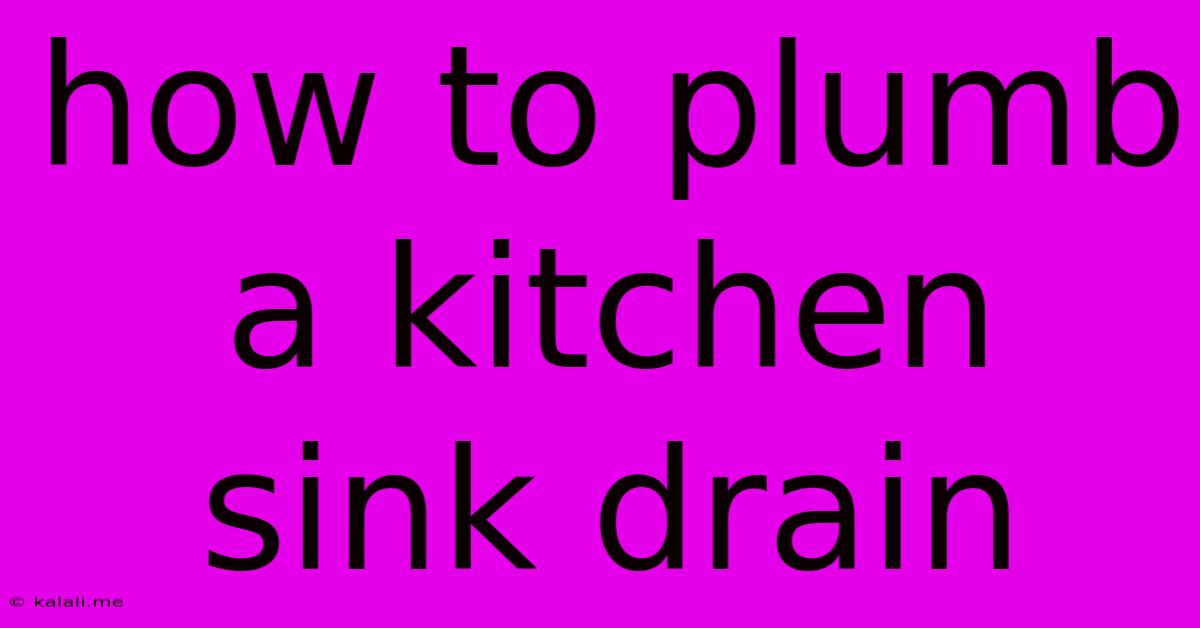How To Plumb A Kitchen Sink Drain
Kalali
May 31, 2025 · 3 min read

Table of Contents
How to Plumb a Kitchen Sink Drain: A Step-by-Step Guide
Plumbing a kitchen sink drain might seem daunting, but with the right tools and a methodical approach, it's a manageable DIY project. This guide will walk you through the process, equipping you with the knowledge to tackle this plumbing task confidently. This comprehensive guide covers everything from gathering the necessary materials to final testing, ensuring a smoothly functioning and leak-free kitchen sink drain.
What you'll need:
- Sink: Obviously! Make sure you have the correct size and type of sink for your application.
- Drain assembly: This typically includes the tailpiece, P-trap, and slip-joint nuts. Choose one that's appropriate for your sink's drain opening.
- Flexible connectors: These are helpful for connecting the drain assembly to the drainpipe.
- Adjustable pliers: For tightening and loosening nuts and fittings.
- Basin wrench: Essential for reaching and tightening nuts under the sink.
- Plumber's putty: For creating a watertight seal around the sink drain.
- Teflon tape: For sealing threaded connections.
- Putty knife: For applying and smoothing plumber's putty.
- Screwdriver (Phillips and flathead): To secure the sink to the countertop and any mounting hardware.
- Level: To ensure the sink is properly installed.
- Bucket: To catch any spills or drips.
- Gloves: To protect your hands.
- Safety glasses: To protect your eyes from any debris or splashes.
Step-by-Step Installation Guide:
1. Preparing the Sink
Begin by carefully placing the sink in its designated location, ensuring it's level and aligned with the countertop cutout. Secure the sink with clips or mounting brackets according to the manufacturer's instructions.
2. Installing the Drain Assembly
Apply plumber's putty to the underside of the sink flange. Carefully position the drain flange onto the sink drain opening, ensuring a good seal. Tighten the nut from underneath using the basin wrench.
3. Assembling the P-Trap
Assemble the P-trap according to the manufacturer's instructions. This usually involves connecting the tailpiece to the drain flange, then connecting the P-trap to the tailpiece using slip-joint nuts. Apply Teflon tape to threaded connections to ensure a watertight seal. Remember to tighten everything securely but avoid over-tightening.
4. Connecting to the Drainpipe
Attach the drainpipe to the tailpiece of the P-trap using the provided flexible connectors. Make sure the connection is secure and leak-free. If necessary, use additional Teflon tape to ensure a good seal.
5. Testing for Leaks
Once everything is assembled, turn on the water and carefully check for any leaks around the drain assembly and connections. Address any leaks immediately by re-tightening connections or applying additional sealant as needed.
Troubleshooting Common Issues
- Leaks: Check all connections for tightness. Re-apply plumber's putty or Teflon tape as needed. A leaky P-trap usually indicates loose connections.
- Slow Drainage: This could be due to a clog in the drainpipe. Use a drain snake or plunger to clear any obstructions.
- Clogged Drain: Regularly cleaning your drain with baking soda and vinegar can help prevent clogs.
Important Considerations:
- Local Plumbing Codes: Always check with your local building codes to ensure your plumbing installation complies with regulations.
- Safety First: Always turn off the water supply before starting any plumbing work.
- Professional Help: If you are uncomfortable performing any part of this process, consult a qualified plumber.
This detailed guide provides a comprehensive overview of plumbing a kitchen sink drain. Remember to always prioritize safety and take your time. By following these steps carefully, you can successfully install a new kitchen sink drain and enjoy a smoothly functioning kitchen. Good luck!
Latest Posts
Latest Posts
-
Mounting A Ceiling Fan On A Slanted Ceiling
Jun 02, 2025
-
High Pressure On Low Side Air Conditioning
Jun 02, 2025
-
Return To The Blue Lagoon Nudes
Jun 02, 2025
-
Can You Eat An Egg That Cracked While Boiling
Jun 02, 2025
-
How To Calculate Cost Basis For Rsu
Jun 02, 2025
Related Post
Thank you for visiting our website which covers about How To Plumb A Kitchen Sink Drain . We hope the information provided has been useful to you. Feel free to contact us if you have any questions or need further assistance. See you next time and don't miss to bookmark.